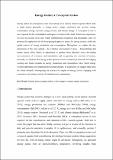Files in this item
Energy justice : a conceptual review
Item metadata
| dc.contributor.author | Jenkins, Kirsten Elizabeth Harrison | |
| dc.contributor.author | McCauley, Darren | |
| dc.contributor.author | Heffron, Raphael | |
| dc.contributor.author | Stephan, Hannes | |
| dc.contributor.author | Rehner, Robert Wilhelm Michael | |
| dc.date.accessioned | 2016-10-29T23:33:51Z | |
| dc.date.available | 2016-10-29T23:33:51Z | |
| dc.date.issued | 2016-01 | |
| dc.identifier | 227374975 | |
| dc.identifier | f05bffd4-7b4b-4647-973a-b55802b713bd | |
| dc.identifier | 84945948255 | |
| dc.identifier | 000379430400017 | |
| dc.identifier.citation | Jenkins , K E H , McCauley , D , Heffron , R , Stephan , H & Rehner , R W M 2016 , ' Energy justice : a conceptual review ' , Energy Research and Social Science , vol. 11 , pp. 174-182 . https://doi.org/10.1016/j.erss.2015.10.004 | en |
| dc.identifier.issn | 2214-6296 | |
| dc.identifier.uri | https://hdl.handle.net/10023/9733 | |
| dc.description | The authors would like to thank the ESRC, EPSRC and Carnegie for funding our work in this area, which has allowed us to conceptually reflect individually and collectively on the notion of energy justice. | en |
| dc.description.abstract | Energy justice has emerged as a new crosscutting social science research agenda which seeks to apply justice principles to energy policy, energy production and systems, energy consumption, energy activism, energy security and climate change. A conceptual review is now required for the consolidation and logical extension of this field. Within this exploration, we give an account of its core tenets: distributional, recognition and procedural. Later we promote the application of this three-pronged approach across the energy system, within the global context of energy production and consumption. Thus, we offer both a conceptual review and a research agenda. Throughout, we explore the key dimensions of this new agenda – its evaluative and normative reach – demonstrating that energy justice offers, firstly, an opportunity to explore where injustices occur, developing new processes of avoidance and remediation and recognizing new sections of society. Secondly, we illustrate that energy justice provides a new stimulating framework for bridging existing and future research on energy production and consumption when whole energy systems approaches are integrated into research designs. In conclusion, we suggest three areas for future research: investigating the non-activist origins of energy justice, engaging with economics, and uniting systems of production and consumption. | |
| dc.format.extent | 250202 | |
| dc.language.iso | eng | |
| dc.relation.ispartof | Energy Research and Social Science | en |
| dc.subject | Energy justice | en |
| dc.subject | Energy policy | en |
| dc.subject | Whole energy systems | en |
| dc.subject | Energy economics | en |
| dc.subject | HB Economic Theory | en |
| dc.subject | GE Environmental Sciences | en |
| dc.subject | T-NDAS | en |
| dc.subject | BDC | en |
| dc.subject | SDG 7 - Affordable and Clean Energy | en |
| dc.subject | SDG 13 - Climate Action | en |
| dc.subject.lcc | HB | en |
| dc.subject.lcc | GE | en |
| dc.title | Energy justice : a conceptual review | en |
| dc.type | Journal article | en |
| dc.contributor.institution | University of St Andrews. Geography & Sustainable Development | en |
| dc.identifier.doi | https://doi.org/10.1016/j.erss.2015.10.004 | |
| dc.description.status | Peer reviewed | en |
| dc.date.embargoedUntil | 2016-10-29 |
This item appears in the following Collection(s)
Items in the St Andrews Research Repository are protected by copyright, with all rights reserved, unless otherwise indicated.

